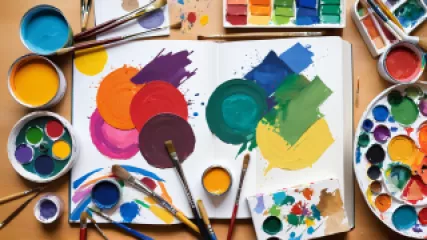Creative Techniques for Expressive Arts Therapy
Welcome to this tutorial on creative techniques for expressive arts therapy. Expressive arts therapy is a powerful tool that combines different art forms, such as painting, drawing, music, and writing, to promote healing and self-expression. In this tutorial, we will explore various techniques that can be used in expressive arts therapy sessions. Whether you are a therapist or someone interested in using art as a form of therapy, these techniques will provide you with a solid foundation to enhance your practice.
1. Collage Therapy
Collage therapy is a technique that involves creating a visual representation by combining different materials, such as magazine cutouts, photographs, and colored paper. This technique allows individuals to express their emotions, thoughts, and experiences in a non-verbal way. It can be particularly effective for those who struggle with verbal communication.
To start a collage therapy session, provide a variety of materials and invite the individual to choose images or objects that resonate with them. Encourage them to arrange these elements on a blank canvas or piece of paper to create a collage. As they work, ask open-ended questions to facilitate reflection and exploration of their feelings.
2. Guided Visualization
Guided visualization is a technique that uses imagery and imagination to access inner resources, promote relaxation, and gain insight. It can be especially beneficial for individuals dealing with anxiety, stress, or trauma. During a guided visualization session, you will verbally guide the person through a series of calming and imaginative scenarios.
To begin, create a calm and comfortable environment. Ask the individual to close their eyes and take deep breaths. Then, guide them through a soothing visualization journey, such as walking through a peaceful garden or floating on a cloud. Encourage them to describe their experience and explore any emotions that arise.
3. Music Therapy
Music therapy harnesses the power of music to promote emotional expression, reduce stress, and enhance overall well-being. It can be particularly effective for individuals who find it easier to communicate through music rather than words. Music therapy can involve listening to music, playing instruments, or creating original compositions.
To incorporate music therapy into an expressive arts session, provide a selection of different genres and ask the individual to choose a song that resonates with their current emotions. Alternatively, invite them to play a musical instrument or create their own melody. Encourage them to reflect on how the music makes them feel and explore any memories or associations that arise.
4. Writing Therapy
Writing therapy, also known as journaling, is a technique that involves writing about one's thoughts, feelings, and experiences. It can be a powerful tool for self-reflection, emotional processing, and personal growth. Writing therapy can be done spontaneously or through guided prompts.
To introduce writing therapy, provide a journal or blank piece of paper and encourage the individual to write freely without judgment or censorship. You can also provide specific prompts to stimulate reflection, such as "Write about a time when you felt proud of yourself" or "Describe a challenge you are currently facing." Encourage them to explore their thoughts and emotions through writing.
5. Movement Therapy
Movement therapy incorporates physical movement and expression to promote emotional well-being and release tension. It can involve dance, yoga, or other forms of body-based activities. Movement therapy allows individuals to connect with their bodies and express themselves non-verbally.
To incorporate movement therapy into an expressive arts session, invite the individual to engage in gentle movements, such as stretching or dancing. Encourage them to focus on their bodily sensations and notice any emotions that arise. Provide a safe and non-judgmental space for them to explore their movements freely.
Remember, these techniques are just a starting point. Feel free to adapt and modify them to suit the needs and preferences of the individuals you work with. Each person's journey and creative process will be unique. By incorporating these creative techniques into your expressive arts therapy practice, you can provide a nurturing environment for self-expression, healing, and personal growth.






